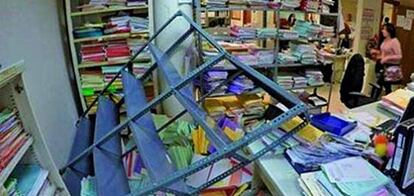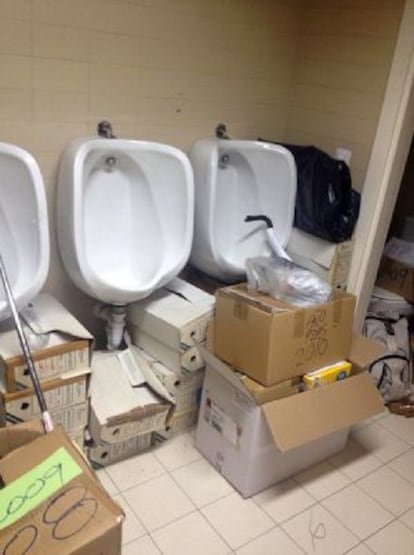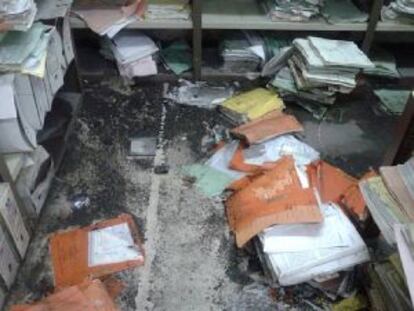Spain’s courts: fit for purpose?
Judges and civil servants say working conditions are intolerable and endanger their safety


Seven years of sustained economic decline, made worse by government indifference and public spending cuts, have had a disastrous effect on Spain’s court buildings, and by extension, the country’s judicial system. Washrooms are filled with piles of folders and evidence; broken windows are taped over with cardboard; power cables are strewn ad hoc across floors; shelves are buckling under the weight of case files; ceilings are falling in; pipes are leaking and plaster is crumbling... These are just a few of the day-to-day realities that many investigating judges and the civil servants who work with them have to put up with.
Inspections by health and safety officers assigned to the Labor Ministry have even led to some courts being closed
The parlous state of Spain’s court buildings impacts not only on the people who work in them, but also on anybody using the judicial system or who is involved in a court hearing – and this issue is not limited to out-of-the-way towns in the country’s less-wealthy regions. In April 2014, a Madrid court was damaged by a fire, while in October, the archives of the capital’s forensic medicine institute were also badly damaged by a blaze, causing the loss of huge numbers of files. In the same month, three courtrooms in Palma de Mallorca’s new courthouse – where Princess Cristina will stand trial for tax evasion next year – were damaged by fire.

Inspections by health and safety officers assigned to the Labor Ministry have even led to some courts being closed, as happened in Alcalá de Guadaíra, in Seville, where part of the ground floor had caved in. In March, in Cadiz, reams of documents were discovered piled up on top of electricity cables in a building with no emergency exits. In the central city of Guadalajara last week, civil servants staged protests about poor air quality and the electromagnetic energy emitted from transformers in the building. Meanwhile, in Madrid’s National Court, where renovation work is due to be completed by the middle of 2015, much of the building is still in poor repair.
In response to the worsening situation, an independent association representing magistrates, the FJI, has launched a campaign on the social networks to raise awareness about the poor state of Spain’s courts. It sent a dossier of photographs to the UPyD, a small, center-right party with five seats in Congress. One of its deputies, Carlos Martínez Gorriarán, raised the matter with Justice Minister Rafael Catalá, who skirted the issue saying only that under Spain’s system of devolved power to the regions, 80 percent of the country’s courts are the responsibility of regional governments. “The 2015 budget includes an increase in investment to improve the buildings and to incorporate new technologies,” he said.
Alejandro Vega of the FJI says that the poor state of repair of Spain’s courts is widespread, with Andalusia, Madrid, and Valencia – the regions with the most courts – the worst affected.

For the moment, the FJI has worked closely with the General Council of the Judiciary (CGPJ), the body that oversees Spain’s legal system, and that is also responsible for making sure that the country’s courts are in good repair. But it says that it is now considering abandoning that position and filing complaints directly to the Labor Ministry’s health and safety teams.
“As a result of recent investigations into corruption, as well as court rulings that affect consumers, the public is now becoming aware of the need for an independent, efficient, well-run justice system. People have always understood the importance of health and education, but the state of the justice system was not a major concern,” said Vega. “But when the public does recognize the importance of an independent legal system, the powers that be will have to respond.”







































